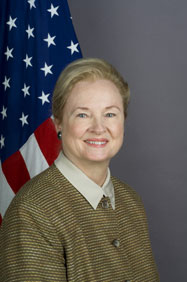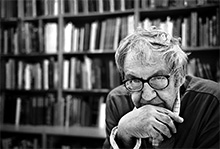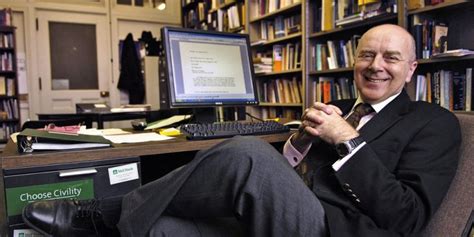A Quote by Mary Ann Glendon
It is becoming plain that our liberal regime of equality and personal freedom depends, more than most theorists of liberalism have been willing to admit, on the existence and support of certain social assumptions and practices: the belief that each and every human being possesses great and inherent value, the willingness to respect the rights of others even at the cost of some disadvantages to one's self, the ability to defer some immediate benefits for the sake of long-range goals, and a regard for reason-giving and civility in public discourse.
Quote Topics
Ability
Admit
Assumptions
Becoming
Been
Being
Belief
Benefits
Certain
Civility
Cost
Defer
Depends
Disadvantages
Discourse
Each
Equality
Even
Every
Existence
Freedom
Giving
Goals
Great
Human
Human Being
Immediate
Inherent
Liberal
Liberalism
Long
More
Most
Others
Our
Personal
Personal Freedom
Plain
Possesses
Practices
Public
Public Discourse
Range
Reason
Regard
Regime
Respect
Rights
Sake
Self
Social
Some
Support
Than
Theorists
Value
Willing
Willingness
Related Quotes
One of the fundamental demonstrations of our natural instinct to Bond with each other is a will to give. Rather than domination, our most basic urge is to reach out to another human being, even at a cost to ourselves. Giving to others-the urge to empathize, to be compassionate, and to help others altruistically-is not the exception to the rule, but our natural state of being. Our impulse to connect with each other has developed an automatic desire to do for others, even at personal cost. Altruism comes naturally to us. It is selfishness that is culturally conditioned and a sign of pathology.
I must admit that I am not a member of the ugly school. I have a great regard for certain notions of beauty even though to some it is an old fashioned idea. Some photographers think that by taking pictures of human misery, they are addressing a serious problem. I do not think that misery is more profound than happiness.
Civility means a great deal more than just being nice to one another. It is complex and encompasses learning how to connect successfully and live well with others, developing thoughtfulness, and fostering effective self-expression and communication. Civility includes courtesy, politeness, mutual respect, fairness, good manners, as well as a matter of good health. Taking an active interest in the well-being of our community and concern for the health of our society is also involved in civility.
The short-range involves the long-range. Immediate steps have to be taken to reeducate our people into the, a more real view of political, economic, and social conditions in this country, and our ability in, in a self- improvement program to gain control politically over every community in which we predominate, and also over the economy of that same community as here in Harlem. Instead of all the stores in Harlem being owned by white people, they should be owned and operated by black people.
We will freedom for freedom’s sake, in and through particular circumstances. And in thus willing freedom, we discover that it depends entirely upon the freedom of others and that the freedom of others depends upon our own. Obviously, freedom as the definition of a man does not depend upon others, but as soon as there is a commitment, I am obliged to will the liberty of others at the same time as my own. I cannot make liberty my aim unless I make that of others equally my aim.
Just like unrestrained economic liberalism, and for similar reasons, sexual liberalism produces phenomena of absolute pauperization. Some men make love every day; others five or six times in their life, or never. Some make love with dozens of women, others with none. It’s what’s known as ‘the law of the market’… In a totally liberal sexual system certain people have a varied and exciting erotic life; others are reduced to masturbation and solitude.
Every scientist, through personal study and research, completes himself and his own humanity. ... Scientific research constitutes for you, as it does for many, the way for the personal encounter with truth, and perhaps the privileged place for the encounter itself with God, the Creator of heaven and earth. Science shines forth in all its value as a good capable of motivating our existence, as a great experience of freedom for truth, as a fundamental work of service. Through research each scientist grows as a human being and helps others to do likewise.
I think it is inevitable that leftist forces in the US would be divided, if not balkanized, to some extent. Among the full range of people who are committed to social and economic equality and ecological justice - i.e. to some variant of a leftist vision of a decent society - it will always be the case that some will be more focused on egalitarian economic issues, others around the environment and climate change, others on US imperialism, militarism and foreign policy, others on race and gender equality, and still others on sexual identity.
...chimpanzees, bonobos, gorillas, and orangutans are thinking, self-aware beings, capable of planning ahead, who form lasting social bonds with others and have a rich social and emotional life. The great apes are therefore an ideal case for showing the arbitrariness of the species boundary. If we think that all human beings, irrespective of age or mental capacity, have some basic rights, how can we deny that the great apes, who surpass some humans in their capacities, also have these rights?
If our well-being depends upon the interaction between events in our brains and events in the world, and there are better and worse ways to secure it, then some cultures will tend to produce lives that are more worth living than others; some political persuasions will be more enlightened than others; and some world views will be mistaken in ways that cause needless human misery.
My main quarrel with liberalism is not that liberalism places great emphasis on individual rights - I believe rights are very important and need to be respected. The issue is whether it is possible to define and justify our rights without taking a stand on the moral and even sometimes religious convictions that citizens bring to public life.
At the heart of my politics has always been the value of community, the belief that we are not merely individuals struggling in isolation from each other, but members of a community who depend on each other, who benefit from each other's help, who owe obligations to each other. From that everything stems: solidarity, social justice, equality, freedom.




































